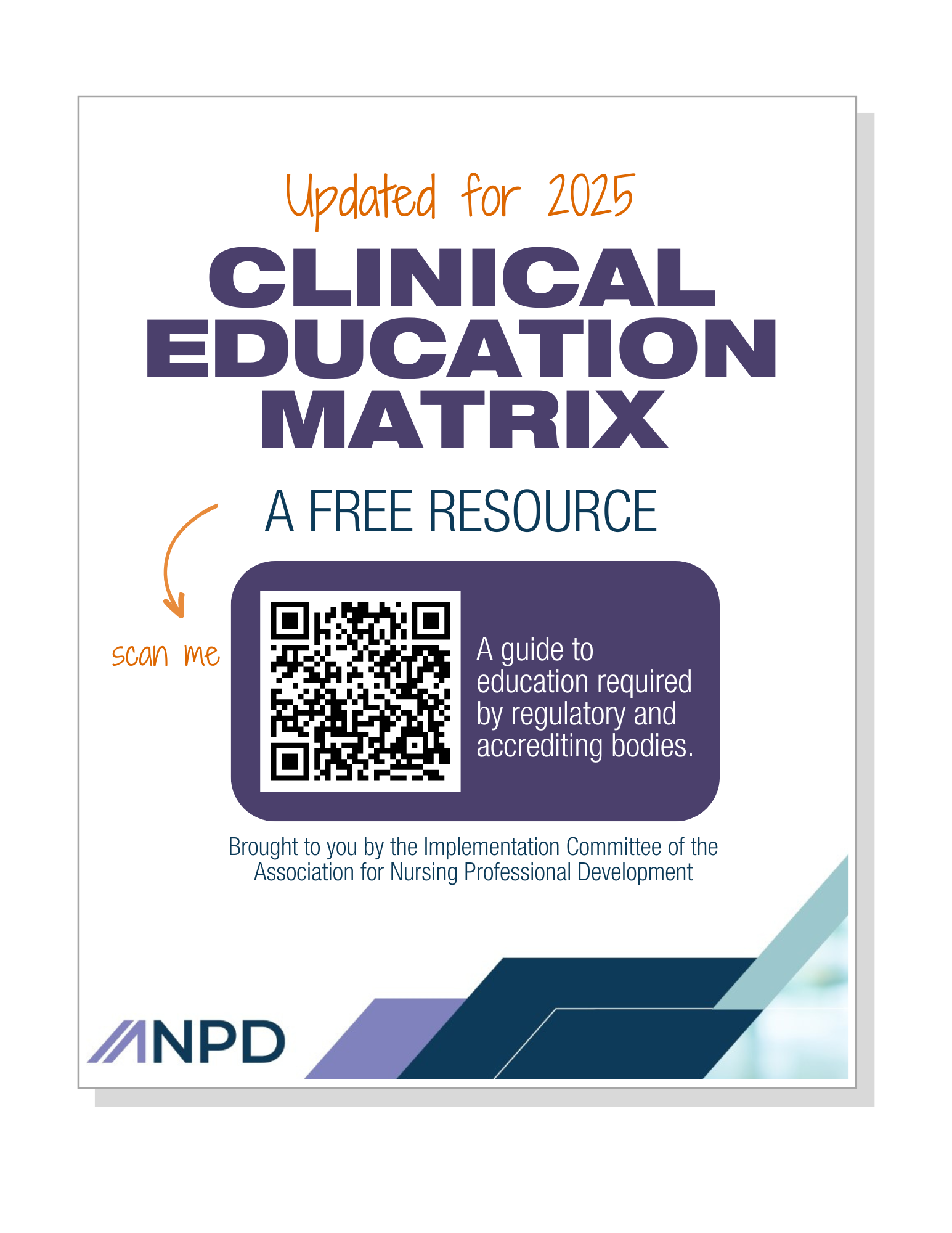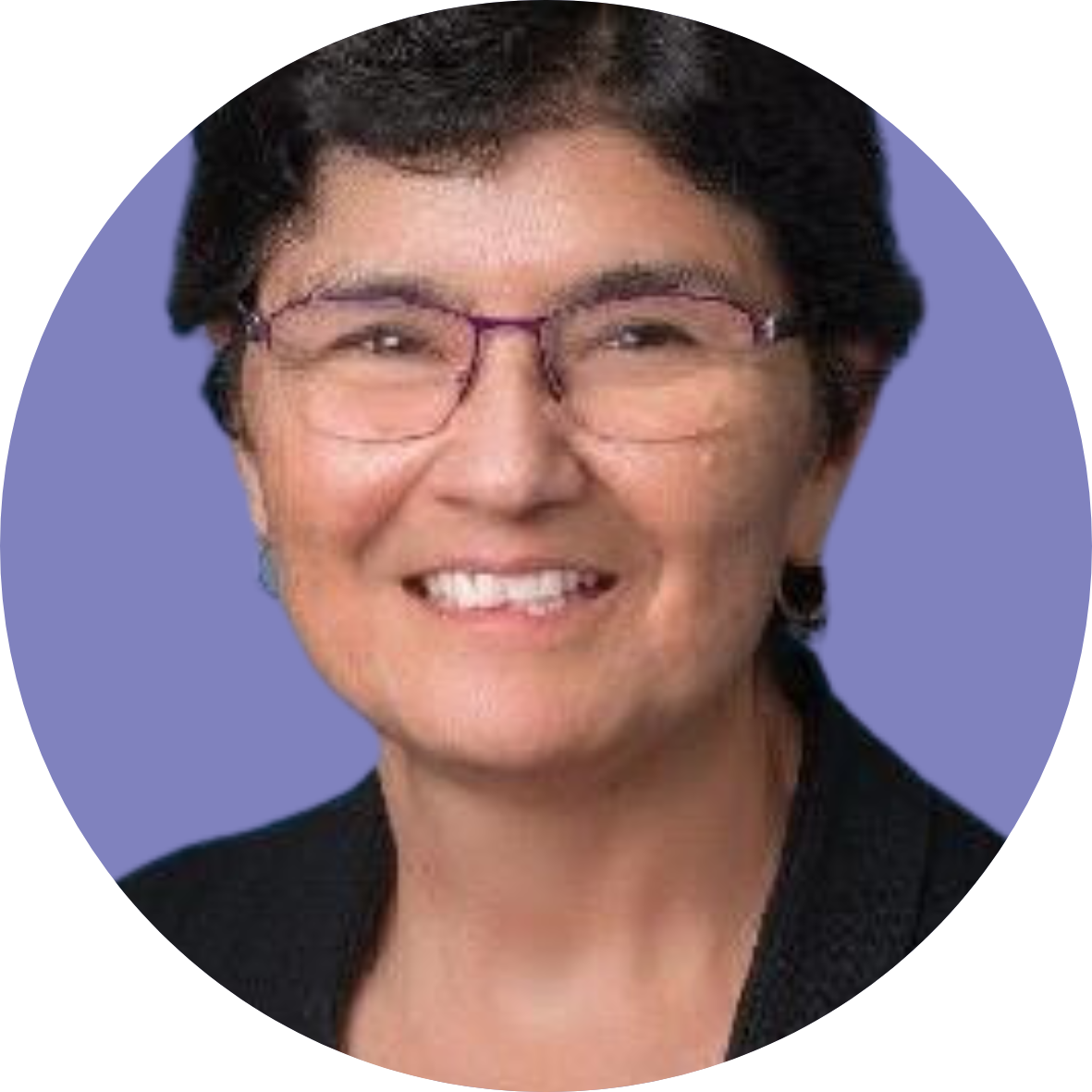Inputs
Navigate Healthcare Accreditation Requirements With the Clinical Education Matrix
September 03, 2024 — Lyndsay Goss, DNP, RN, CNE, NPD-BC
Dawn M. Nelson, MS, RN, NPD-BC
Martha Zepeda, DNP, RN, NPD-BC
A common challenge for most nursing professional development (NPD) practitioners is keeping track of the various types of required staff education.
Requirements seem endless, from the different regulatory and accreditation bodies, as well as system and organizational needs. NPDs often wonder where to start. Sifting through countless pages of standards and regulations trying to find those one or two paragraphs that state the training and education requirements is time-consuming and frustrating. Plus, there is always the fear of missing something, and the time to find that out is not when you are sitting with a surveyor reviewing employee education files.
Balancing the professional responsibilities along with an expectation to have all of the answers makes it challenging to respond to questions such as: “What education is required to provide my staff initially and annually?”
The Importance of Maintaining Accreditation
NPDs need a comprehensive understanding of the various education requirements for accrediting healthcare agencies. NPD practitioners need to ensure the development of programs, initial training, and ongoing competency meet the standards of quality and compliance that accrediting bodies expect. These requirements increase patient safety, enhance quality of care, and maintain the organization’s accreditation status.
Accreditation status significantly impacts an organization’s reputation and funding. By serving as an expert on the standards and requirements, NPD practitioners can create targeted educational programs that fulfill regulatory requirements and empower nurses to excel in their roles, ultimately leading to improved outcomes and organizational excellence.
Enter the Clinical Education Matrix
The Association for Nursing Professional Development (ANPD) has a free resource that can help! The Clinical Education Matrix serves as a guide to the education and competency requirements for staff. This spreadsheet is organized by the regulatory and accreditation bodies. Agency Standards from the Centers for Medicare and Medicaid Services (CMS), The Joint Commission (TJC), Det Norske Veritas Healthcare (DNV), the Commission on Accreditation for Rehabilitation Facilities (CARF), and more are included. Each agency is represented by a tab on the Matrix spreadsheet with the standards or regulations that contain education requirements. The spreadsheet columns include headers for the topic, requirement, interpretive guideline and/or survey procedure, effective date, what type of training (initial, annual, as needed), whether an organizational policy is indicated, and the target audience to be trained. The columns can be filtered for ease of searching. For the NPD practitioner, The Clinical Education Matrix is a great resource tool to serve as an introduction and knowledge of the current standards and regulations. Each is named along with its identifying number to assist the NPD practitioner in referencing the original source for additional information.
The Clinical Education Matrix is updated annually by members of ANPD’s Implementation Committee. This committee is comprised of volunteer NPD practitioners working in a variety of practice settings across the United States. Members collaboratively work over the course of a few months while consolidating updates and changes to this resource. A recent addition to the 2024 update includes light blue boxes to indicate any changes in the requirement since last year. This is particularly useful for NPD practitioners who already utilize this tool on a regular basis and are interested in the updates specifically.
The Clinical Education Matrix can be found on the ANPD website under the “Resources” section, and then through the “For NPD Practitioners” link. You can watch this short video to learn more about how to access and navigate this resource.
Download this flyer to post in your practice setting for easy access to this invaluable resource and to share with your colleagues.

We hope you find this resource valuable. See below for recent feedback from a member:
“After being tasked with creating the annual competency skills workshop for my organization, I was overwhelmed with what should or should not be included. So many opinions were going around, but I was afraid I would miss something that was required. A colleague showed me The Clinical Education Matrix, and I was able to use this resource to verify what competencies need to be demonstrated by staff and how often. The Matrix let me compare what Centers for Medicare & Medicaid Services (CMS) and The Joint Commission (TJC) require. This resource is the perfect starting point in developing annual competencies along with my state board of nursing and organizational policies.”
Disclaimer: This document is a guideline for required education—not an official document. Requirements for education vary based on many factors, and some states may have requirements in addition to those portrayed here. Each organization is responsible for ascertaining the education required for its staff.

Lyndsay Goss, DNP, RN, CNE, NPD-BC
Director of Continuing Professional Development, Nursing, Southern New Hampshire University
Dr. Lyndsay Goss has over a decade of extensive experience in nursing professional development and education. As the director of continuing professional development in nursing at Southern New Hampshire University (SNHU), she leads the continuing education unit, empowering nurses and healthcare professionals to achieve excellence in their careers. With a background in community health and ambulatory care, Dr. Goss continues to serve as an adjunct faculty in undergraduate nursing and graduate public health programs. Her influence extends beyond academics, as she actively participates in various local and national nursing boards and committees. In addition to her role at SNHU. Dr. Goss has presented nationally and internationally, dedicating herself to advancing nursing professional development and education on a broader scale. As a certified nurseeducator and board-certified nursing professional development practitioner, Dr. Goss continues to make significant contributions to the field.

Dawn M. Nelson, MS, RN, NPD-BC
Nursing Education Specialist and Assistant Professor of Nursing, Mayo Clinic College of Medicine at Mayo Clinic
Dawn M. Nelson is a nursing education specialist and assistant professor of nursing for the Mayo Clinic College of Medicine at Mayo Clinic in Rochester, MN where she has worked for 36 years. Nelson currently coordinates the Department of Nursing Preceptor and Mentorship programs. Previously, she supported the hematology/oncology/blood and marrow transplant specialty as a nursing education specialist, worked as a discharge planning specialist and as a staff nurse in the pediatric, occupational health and surgical specialties. Nelson has served as adjunct professor at Winona State University and the University of Minnesota. She is board-certified in NPD and has presented nationally and internationally on the topics of engaging educational strategies, preceptor support and development, mentorship, and the Tiered Skills Acquisition Model (TSAM®) for clinical orientation.

Martha Zepeda, DNP, RN, NPD-BC
Senior Associate Faculty, University of Phoenix College of Nursing
Dr. Martha Zepeda, DNP, RN, NPD-BC, is senior associate faculty at the University of Phoenix College of Nursing, teaching registered nurses pursuing RN to BSN and MSN nursing degrees. Dr. Zepeda is a registered nurse with over 40 years of experience and has worked in a variety of acute care hospital settings as well as teaching in her senior associate faculty role. She obtained her Doctor of Nursing Practice degree from Walden University. Dr. Zepeda has extensive experience in nursing education and nursing professional development, performance improvement, shared governance, and nursing research. She has participated in research studies for the University of Phoenix and in the acute care hospital setting and has performed her own research on nurse empowerment and life-sustaining decisions in the older adult population. Dr. Zepeda is certified in NPD and has presented her research and topics such as shared governance at various national conferences.